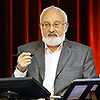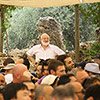Audio Version Of The Blog – 5/1/24
Listen to an Audio Version of the Blog
Download:MP3Audio

Listen to an Audio Version of the Blog
Download:MP3Audio
 Question: How does the Kabbalistic explanation of our world and the Passover holiday differ from the usual comments?
Question: How does the Kabbalistic explanation of our world and the Passover holiday differ from the usual comments?
Answer: There are several levels of explanation of existence, its creation, development, goals, and tasks of a person in it. For example, you can talk about the Passover holiday about:
1. The historical period of slavery of the nation in Egypt,
2. The “slavery” of man in his egoism—Egypt—Pharaoh,
3. The development of creation—desire under the influence of the Creator’s light and its absence under the influence of darkness—Egypt—Pharaoh.
You can also speak at different levels about:
1. The mechanical performance of rituals, which are commonly called commandments,
2. The psychological fulfillment of the instruction “love thy neighbor as thyself,” as a general (Klal) instruction of the Creator, which includes all other instructions, as it is said in the Torah: “Love thy neighbor is the general law of the Torah,”
3. The Kabbalistic influence of the upper light on the worlds and through them about souls that go through the stages of their spiritual development—correction.
[156182]
Related Material:
Passover
Questions About Pesach
Everything Starts With Pesach
 Question: “Pesach” (from the word “Pasach“) means to step over or jump over from egoistic qualities to altruistic ones, to the qualities of the Creator.
Question: “Pesach” (from the word “Pasach“) means to step over or jump over from egoistic qualities to altruistic ones, to the qualities of the Creator.
Kabbalists described the procedure for emerging from egoism allegorically in the order of the Passover meal. One of the symbols of Passover is the prohibition of eating leavened bread. What does leavened bread symbolize in our inner work?
Answer: The prohibition of eating leavened bread means that if you wish to leave Egypt, you cannot apply any intentions for yourself. If you want to exit from egoistic desire, you must rid yourself of all actions that keep you in this intention.
Question: What does Matzah, called the bread of poverty, symbolize?
Answer: Bread is what sustains a person. Exiting from the egoistic state means that one starts consuming food that does not feed the egoism, but only provides spiritual strength, the quality of bestowal. The custom of eating Matzah signifies that a person should receive just what is necessary to sustain the body and with everything else, work for the sake of bestowal.
Question: Another symbol of Passover is the pre-Passover cleaning. What is the significance of this?
Answer: It means that we must completely renounce egoistic desires. Thus, we leave Egypt, i.e., our collective egoistic intentions for “oneself.” Therefore, we must cleanse ourselves of leavened bread (Hametz), which symbolize these intentions and various actions on all levels: inanimate, vegetative, animate, human, from everything around us and within us. It is written: “You shall remove leaven from your houses.”
[280433]
From KabTV’s “Spiritual States” 3/28/21
Related Material:
Passover
Questions About Pesach
Everything Starts With Pesach
 Question: What are the actions where there is no pleasure for the desire to receive and only for the desire to give through friends to the Creator?
Question: What are the actions where there is no pleasure for the desire to receive and only for the desire to give through friends to the Creator?
Answer: These are acts of giving—actions opposite to egoism.
To translate this action into ever closer unity with our friends, we need to accept the obligation that instead of hatred between us, at least in the ten, we want to become close friends who help each other.
Question: What is a genuine spiritual action? How can we, by working in the ten and making efforts, invoke mutual pleasure in each other so that together we can enjoy mutual giving and thereby give to the Creator?
Answer: We cannot do this because we are born and raised in the quality of egoism. But gradually, by working on ourselves, we attain a negative attitude toward egoism and eventually acquire opposite qualities: love for others, love for the Creator, and altruism.
[327799]
From the Daily Kabbalah Lesson 4/9/24, Writings of Rabash “The Need for an Act from Below”
Related Material:
Strengthen the Circle of Bestowal
Mastering The Quality Of Bestowal And Love
Managing Desires
 Question: When it is necessary to say “no” to the desire to receive where does one get an understanding of how to act correctly?
Question: When it is necessary to say “no” to the desire to receive where does one get an understanding of how to act correctly?
Answer: If a person is properly inclined to fulfill some kind of prohibition, then he receives knowledge and strength and implements the action.
Question: How can we constantly approach the Creator, the upper world, and not give in to what the desire to receive establishes?
Answer: Remember that the Creator gives us this. Such understanding will give us strength.
We should strive to maintain a constant connection with the group and with the Creator, the confidence that it is He who sets all the obstacles before us, and yet we must move toward Him.
[327923]
From the Daily Kabbalah Lesson 4/11/24, Writings of Baal HaSulam “The Purpose of the Work – 2”
Related Material:
To Win the War Against Evil
When Failure Becomes Success
Our Guiding Star
 Question: What is the difference between truth and justice?
Question: What is the difference between truth and justice?
Answer: These are different spiritual categories. Justice is that we weigh one thing against the other.
And truth is something that we do not weigh, but understand that it is true in itself.
Question: When you discover a not-very-pleasant truth about yourself, it is tough to strive for it. I want to run away. How do I go through it?
Answer: Accept that rapprochement with the Creator is more important than your feeling in this state.
Question: Why do we need to ask for justice and not mercy?
Answer: Justice is equal for everyone. And mercy means that you have some special feelings for someone or something.
[327595]
From the Daily Kabbalah Lesson 4/2/24, Writings of Rabash “Justice, Justice You Shall Pursue”
Related Material:
Mercy, Justice, And Peace
Mercy Is Contact with the Creator
Truth and Verity
 And the man asked him, saying, ‘What are you seeking?’ And he said, ‘I seek my brothers… (Rabash, Article No. 3, (1984) “Love of Friends – 1”)
And the man asked him, saying, ‘What are you seeking?’ And he said, ‘I seek my brothers… (Rabash, Article No. 3, (1984) “Love of Friends – 1”)
“I seek my brothers” is the beginning of working in a group. It is when a person tries to unite with his friends in the ten because there is no advancement without it. Therefore, first of all, we must work in a group: group study, mutual help, and mutual interconnection of every person with all the others.
The ten is the most important thing. A larger number is bad because we are made so that we cannot feel more than ten. And you do not need less than ten either. Ten is the optimal number.
Everyone needs to really understand the ten he is in, what he should do for it, what it should do for him, and how they interconnect. Depending on the common bond between a person and his ten, he will begin to attain the Creator. This is our main goal.
We have no other goal but to reveal the Creator. At the same time, we will begin to understand, attain, and feel everything. This is why the ten’s gatherings, the closeness we reach in it, the feeling of mutual belonging, and mutual assistance are very important.
Often people push themselves away from this considering it not so important. Therefore, I advise you to listen to my words, all Kabbalistic sources speak of it.
At first tens work on themselves, organize within themselves, and then form a larger group, and so on. Without this closeness, we will not achieve high spiritual goals. This is the law of the spiritual world.
[327628]
From the Daily Kabbalah Lesson 4/5/24, Writings of Rabash “Love of Friends – 1”
Related Material:
The Ten Is an Instrument in the Hands of the Creator
The Ten—A Device For Revealing The Creator
Work In The Ten
 Question: Can we start asking for correction without delving into the evil that our quality of Haman shows us? Or do we have to live through and feel all of it?
Question: Can we start asking for correction without delving into the evil that our quality of Haman shows us? Or do we have to live through and feel all of it?
Answer: It can be both ways; it depends on the state we are in. But in principle, you can ask.
Question: Do I need to ask the Creator to correct the qualities of Haman within me without delving and digging within myself, or do I have to consciously recognize the root of evil in me and ask from there?
Answer: You must realize the root of evil in yourself and ask from there. The root of evil is the desire to receive for your own sake that the Creator has created.
[327855]
From the Daily Kabbalah Lesson 3/25/24, Writings of Baal HaSulam “Haman from the Torah, from Where?”
Related Material:
So that Haman Disappears Forever
Why Does Haman Want To Kill Mordechai?
The Characters Of Purim: Haman
 Question: On one hand when I am on the path of bestowal, I pray for myself to exit Egypt.
Question: On one hand when I am on the path of bestowal, I pray for myself to exit Egypt.
On the other hand, I should pray for my friends to feel their deficiency and be directed toward them. How can I combine these different approaches?
Answer: The point is that we must feel our state in different parameters. For example, one state is when I sit in my egoism and do not want to get out of it.
Another state is when I want to break free from my ego but cannot ask for it; I lack the strength. A third state is when I am ready for anything just to rise from egoism to the quality of bestowal and love.
Generally, there can be many such states.
[327839]
From the Daily Kabbalah Lesson 4/10/24, Writings of Rabash “Concerning the Beginning of the Month”
Related Material:
Unite To Exit Egypt
Getting Out of Your “Egypt”
We Exit Egypt Every Second
 Question: I often hear that not noticing flaws is faith above reason. Is that so?
Question: I often hear that not noticing flaws is faith above reason. Is that so?
Answer: No, faith above reason is a state where a person, despite what he feels, sees, and explores, goes above it.
First, we must scrutinize our attitude toward the Creator and our friends and understand whether we are in plus or in minus. Accordingly, we should treat them in a way that makes us the corrected group and always care about it.
Comment: But this scrutiny can stumble upon someone and tell you: “Sorry, this is just how you see it; it is your flaw.”
My Response: No one has the right to interfere in another’s work. A person acts according to the way he determines.
[327813]
From the Daily Kabbalah Lesson 3/21/24, Writings of Baal HaSulam “There Is a Certain People”
Related Material:
Despite Reason
What Is Faith Above Reason?
Going With Faith Above Reason